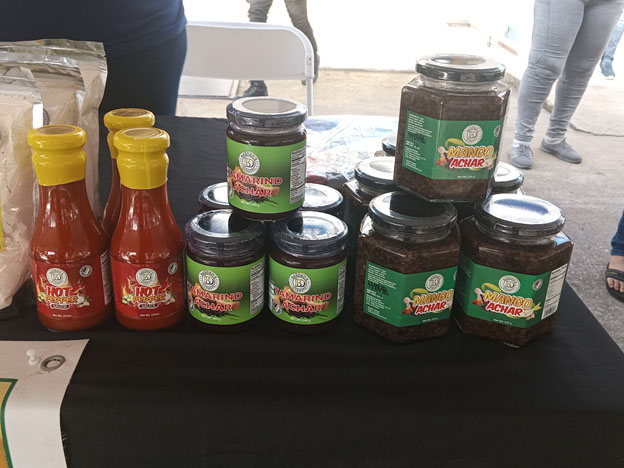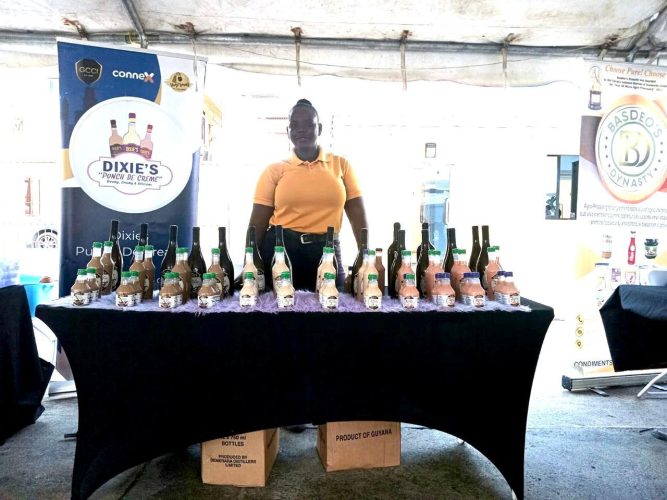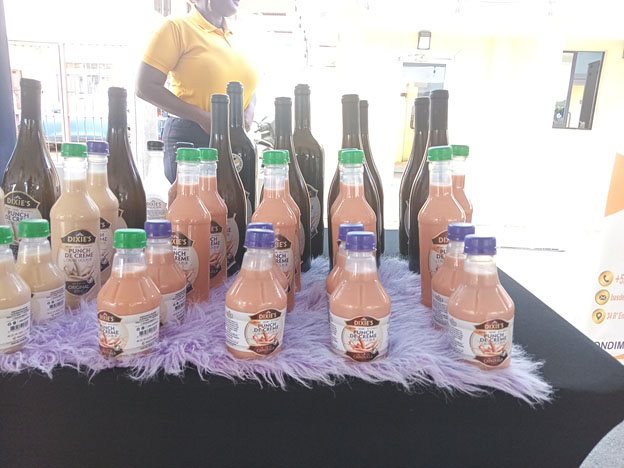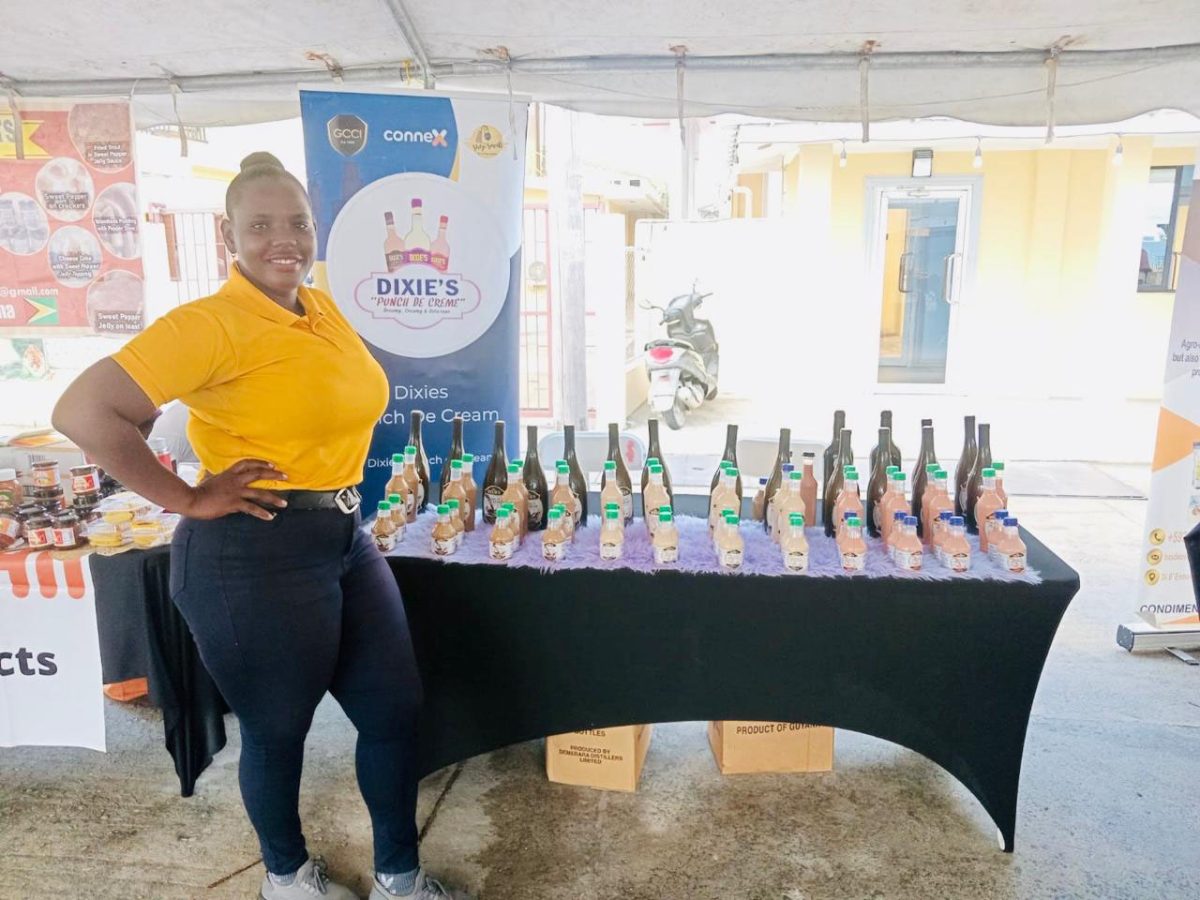At 23, Dixie Jordan is almost unique in her choice of entrepreneurial pursuit. Here in Guyana, the manufacture of alcohol or alcohol based (laced?) beverages has traditionally the purview of the ‘heavy hitters’ and here the names Banks DIH Ltd., And Demerara Distillers comes
immediately to mind. If the ambitious young Buxtonian’s credentials hardly match those of the two giants in the local alcohol/alcohol-based sector, her standout quality is her seeming determination to direct her limited resources into aiming at the ‘top shelf’ in terms of her choice of entrepreneurial venture.
Remarkably, her establishment, Punche de Crème, has come this far with the requisites that are associated with the manufacture of rum spirits and sophisticated liqueur. What, today, is marketed as Dixie’s Punche de Crème derives from a largely unsophisticated tasting process – largely at the level of family and friends that eventually yields a preferred product. Not that Dixie’s Punche de Crème emerged directly from what one might call a ‘tasting lottery’ out of which the final choice is made by a show of inexpert hands, Dixie asserts her credentials as a professional Mixologist, having been trained and certified at the Trinidad and Tobago Hospitality and Tourism Institute. “[They taught us] how to combine flavours using natural products to produce these amazing cocktails,” she told the Stabroek Business.


 Listening to the views of a twenty-three year-old Guyanese woman on the subject of alcohol can be a near surreal experience. That notwithstanding, it appears that Dixie was able to persuade her relatives and friends that if she could manage to graft a business focused onto her pre-existing tuition in Mixology she might very well be ‘on to something.’ In March 2020, Dixie ‘took the plunge,’ fending off the COVID ‘monster’ that had unerringly targeted the business sector. She credits a friend of hers who had opined that her (Dixie’s) familiarity with alcoholic beverages (coupled with the experience that she had gained of bar tending) was sufficient to at least ‘give it a go.’
Listening to the views of a twenty-three year-old Guyanese woman on the subject of alcohol can be a near surreal experience. That notwithstanding, it appears that Dixie was able to persuade her relatives and friends that if she could manage to graft a business focused onto her pre-existing tuition in Mixology she might very well be ‘on to something.’ In March 2020, Dixie ‘took the plunge,’ fending off the COVID ‘monster’ that had unerringly targeted the business sector. She credits a friend of hers who had opined that her (Dixie’s) familiarity with alcoholic beverages (coupled with the experience that she had gained of bar tending) was sufficient to at least ‘give it a go.’
Not unlike a host of other startups in the product-manufacturing sector, Punche de Crème would have been unlikely to win prestigious international awards for product presentation. Dixie recalls that her last salary as a paid employee was spent ‘turning out’ the company’s first batch (a small one) of product which broke all the conventional rules of packaging and labelling having been turned out in recycled beer bottles and therefore possessing no ‘market’ beyond family members, friends and well-wishers. There was, therefore, no moment of unbridled euphoria.
Dixie’s ‘sobering moment,’ however, proved to be a fork in the road. She recognized that beyond ‘pats on the back’ from family members and friends, commercial success could only be realized through the clearing of several hurdles. Here, she was only too aware that where tasting ‘huddles’ involving well-meaning but, for the most part, inexpert judges of product quality, presentation was likely to be insufficient to clear the hurdle of far more demanding panels both within and outside the sector.
The road ahead was strewn with other obstacles too. Not least of these was the formidable challenge of financing a new product, not least one that would face competition from both local and imported rivals. What had been accomplished up to that time had ‘soaked up’ Dixie’s savings. Going forward, she knew that financing would be ‘a monster.’ The manufacturing sector, Dixie was to learn over time, goes beyond simply producing and placing on the market. Accordingly, she has learnt to appreciate the value of the certification that her product has acquired from both the Government Analyst Food and Drugs Department (GAFDD) and the Guyana National Bureau of Standards. (GNBS).
Modest business startups in some sectors – and the alcoholic beverage sector is certainly one of those – is often attended by subsequent ‘hard grind’ as Dixie has found out over time. Any local entrepreneurial excursion into the liqueur industry must gird its loins to face the stiffest of challenges from the battle-hardened imported brands that have monopolized the ‘lion’s share’ of the available space in the sector. Here, her particular challenge reposes in incrementally enhancing the profile of a product that has emerged at a time when the Guyana market is well and truly ‘open for business’ as the interest of expatriate Guyanese and potential investors alike add value to the country’s global rating as an investment haven.






